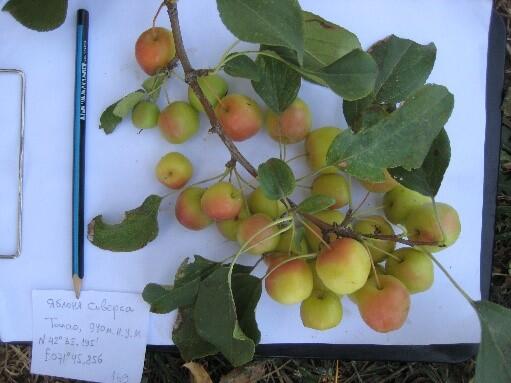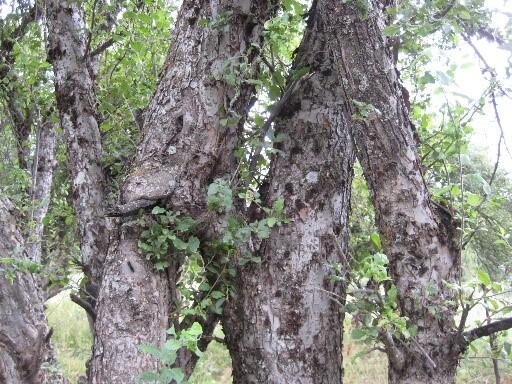Sustainable RegionALMAanagement and Value Creation for the Preservation of Old Apple Varieties in Kazakhstan and Kyrgyzstan – "ALMA"
International project funding
Subject and goals of the project
Central Asia is one of the hot spots of the climate crisis, but also of biodiversity - as everywhere, the interactions between climate change and biodiversity loss are closely intertwined. Even the Asian wild apple Malus sieversii is now on the Red List of the International Union for Conservation of Nature and Natural Resources (IUCN). 70 percent of the original habitat has already been lost due to agricultural land expansion, construction, intensification, genetic erosion and overgrazing of semi-natural areas (e.g. orchards). This process can only be stopped to a very limited extent by designating protected areas. Sustainable use concepts, such as those successfully implemented in many German protected areas, would be more effective. Ideally, such concepts should be based on the complete modelling of the value chain from the origin to the utilisation of a product. This is to be implemented in the proposed project using the example of the Asian wild apple together with Kazakh and Kyrgyz partners. The purely economic perspective is to be supplemented by the aspect of ecosystem services (ESL). The project will develop a model of an ecosystem service-oriented value chain "wild apple", the implementation of which in theory and practice should secure the survival of existing wild apple stands. By integrating the project methods, scientific and practical findings and results into existing curricula of the cooperating universities, an environmental education effect will be achieved in addition to environmental relief, which will have an additional multiplier effect after the successful completion of the project.
The project is divided into three modules, which are developed jointly by an interdisciplinary team of representatives from the fields of socio-economics, business administration, agricultural sciences, ecology, land use, nature conservation and companies in the field of fruit growing. For this purpose, a complementary evaluation of existing habitats and the definition of ESSL indicators will be carried out first. On the basis of the relevant areas thus identified for the project, such as wild apple areas, orchards, apple orchards and plantations, the theoretical ESSL valorisation or its potential/natural capital is carried out in the second module. On this basis, different value creation paths (water, carbon, ecological footprint) are calculated and related to the defined sustainability aspects. The necessary classification of ecosystem services is carried out taking into account relevant studies (e.g. "The Economics of Ecosystems and Biodiversity – TEEB") and classification and action recommendations (e.g. "Common International Classification of Ecosystem Services – CICES"). In the third module, a communication strategy is developed and implemented, the most important component of which is a management tool as a decision support instrument for stakeholders (e.g. owners of wild apple stands, marketing and processing entrepreneurs, political decision makers). Module 3 thus also contains a catalogue of measures for "capacity building" to ensure the transfer and communication of the project results.
The project will be presented at various professional events during the project period and at the end of the project, both in the internal cooperation network and at appropriate public initiatives. The management tool for building ESSL-oriented value chains will not only be published, but also communicated to practitioners via a guide. The project partners include the results in their respective internet presentations. The integration into the curricula of study courses at the participating universities ensures the continuity of the academically relevant knowledge even after the end of the project.
Innovation and exemplary nature of the project
The cultivation of apples in orchards is considered one of the prime examples for the protection of extensively used cultural landscapes in Germany. Numerous projects have been implemented in recent years. However, socio-economic questions as well as aspects of the valorisation of ESSL still play a subordinate role. It would make sense to carry out a complete modelling of the value chain from the origin to the utilisation of a product, taking into account socio-ecological aspects as well as economic issues. However, this requires a degree of inter- and transdisciplinarity that is rarely found. In this respect, the project offers a very good opportunity to play this out. In this respect, NETSCI GmbH can count on highly motivated and committed project partners from science and practice along the value chain. The partners benefit from the fact that this is a really pressing issue, namely the preservation of old apple varieties, for which the project area bears a special responsibility. The governments involved want to take on this responsibility - in this sense, a favourable window of opportunity is currently opening up that should be used. Ultimately, the development of structures for sustainable regional marketing to preserve biodiversity plays a decisive role. An important indicator in this context are eco-systems, which are to be systematically integrated into the management tool to be developed within the framework of the project. It is also essential for the planned project to involve all stakeholders. A comprehensive communication concept is planned for this purpose.
Special aspects of the project
Der Inwertsetzung von Ökosystemleistungen kommt im Biodiversitätsschutz eine entscheidende Rolle zu. Am Beispiel des Streuobstwiesenanbaus von Äpfeln soll im Rahmen des Projekts versucht werden, diesen Aspekt entlang von Wertschöpfungsketten durch zu deklinieren. Gemeinsam mit den Projektpartnern aus Kasachstan und Kirgistan soll damit ein wertvoller Beitrag zur Bewahrung alter Apfelsorten geleistet werden. Die zu entwickelnden Konzepte werden einen direkten Praxisbezug haben, so dass diese auch nach Projektende weitergeführt werden können.
Funding subject: Nature conservation and sustainable use of nature in cultural landscapes and protected areas
Cooperation partners:
- NETSCI Prof. Dr. Matthias Kramer GmbH, Niesky, Saxony
- Kyrgyz National Agricultural University K.I Skryabin, Bishkek, Kyrgyzstan
- Kazakh National Agricultural University, Almaty, Kazakhstan
Locations: Saxony, Kazakhstan, Kyrgyzstan
Funding period: February 2021 to January 2023
Project costs: Total volume: 214 945 Euro, DBU funding: 124 135 Euro
DBU-AZ: 37087
Note: Translation of the German version with DeepL
Last updated: 20.05.2022



